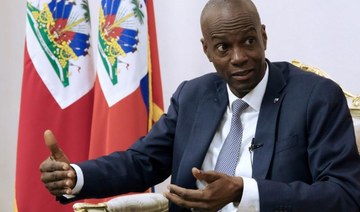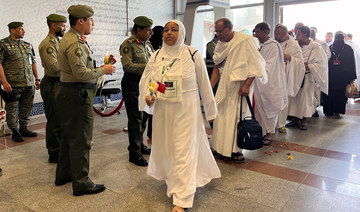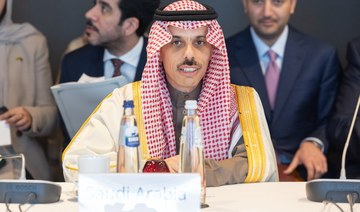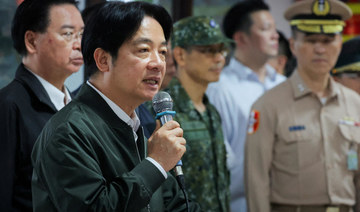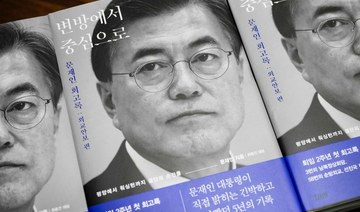BOGOTÁ, Colombia: Former Colombian soldiers arrested in Haiti in the assassination of President Jovenel Moïse have accused local authorities of torture, saying they’ve been burned, stabbed and hit in the head with a hammer, among other things.
Details of the alleged torture are contained in a Sept. 6 letter addressed to Colombia’s president and other high-ranking officials as well as the Interamerican Court of Human Rights and the International Committee of the Red Cross. It was signed by the 18 former soldiers arrested in the slaying.
Relatives of the soldiers provided a copy of the letter to The Associated Press but asked not to be identified for their safety, saying only that they received the letter electronically.
In the letter, the soldiers accuse Haitian police officers of shooting at them with powerful weapons when they tried to turn themselves in with their hands raised just hours after Moïse was killed at his private home on July 7.
“We were deceived by people and companies in the United States and Haiti that seek to accuse us of acts for which we are not responsible. Don’t let an injustice be committed,” they wrote.
Several days after the killing, Colombian President Iván Duque said the majority of the former soldiers arrested were duped and thought they were traveling to Haiti for a legitimate mission to provide protection. He said only a small group of them knew it was a criminal operation.
In the letter, the ex-soldiers describe how police tortured and then executed one of their colleagues who was injured after being shot by Haitian officers while trying to turn himself over. He was one of three former Colombian soldiers killed. The letter also accuses police of kicking some ex-soldiers in the testicles and even burned one of them in their groin, allegedly while saying that human rights don’t exist in Haiti and that they could whatever they wanted.
The ex-soldiers alleged that other colleagues were thrown against walls, one had his foot burned with hot oil, another was kicked in the mouth and suffers from two broken teeth and that police released at least three of them to a crowd that attacked with machetes or stabbed them.
They also accused authorities of keeping all of them handcuffed for 24 days, and that they didn’t receive food or water in the first two days after their capture. They wrote that the bathrooms in the cell they were being held at in police headquarters weren’t working, so feces filled the area and caused their wounds to become infected.
The lack of timely medical attention also was denounced by the Colombian Ombudsman’s Office, a state entity in charge of ensuring human rights, after a July 26 visit with the ex-soldiers. In its report, the office warned that three of the detainees had considerable injuries and needed specialized medical treatment.
Once they were transferred to a penitentiary, the ex-soldiers said there were no bathrooms and no potable water, which they either have to buy or wait for a good Samaritan to bring them some. They noted that they get fed only once a day and that some of the ex-soldiers have lost up to 44 pounds (20 kilograms).
The United Nations and other organizations have long denounced prison conditions in Haiti, noting that they are severely overcrowded and that inmates are often ill-treated, sometimes tortured and can spend more than a decade behind bars without going to a single court hearing or being charged with anything.
In their letter, the ex-soldiers added they don’t have an attorney, don’t know what charges they face and that they’re barred from calling their families: “We find ourselves completely isolated.”
The ex-soldiers also said that Haitian authorities already had prepared written statements before interviewing them and ordered them to sign the documents drafted in a language they didn’t understand.
“Torture has been employed as a way to obtain statements,” they wrote.
The ex-soldiers said one of the main officials overseeing the case was responsible for the torture, calling him a “professional” in torturing humans. They did not identify him.
“We thank you in advance for your attention and prompt response to this cry for help and complaints,” they wrote.
Neither the office of Colombia’s president nor the foreign ministry immediately returned messages for comment. A spokeswoman for Haiti’s National Police did not immediately respond to a request for comment.
Haitian authorities have detained more than 40 suspects in the killing of Moïse during an attack in which his wife, Martine Moïse, was injured. Meanwhile, court clerks investigating the case have gone into hiding after being threatened with death if they didn’t change certain names and statements in their reports.
In addition, a Haitian judge assigned to oversee the investigation stepped down last month citing personal reasons. He left after one of his assistants died in unclear circumstances. A new judge has been assigned, but the former Colombian soldiers have yet to appear in court.
Colombian ex-soldiers in Haiti accuse police of torture
https://arab.news/jz5jn
Colombian ex-soldiers in Haiti accuse police of torture
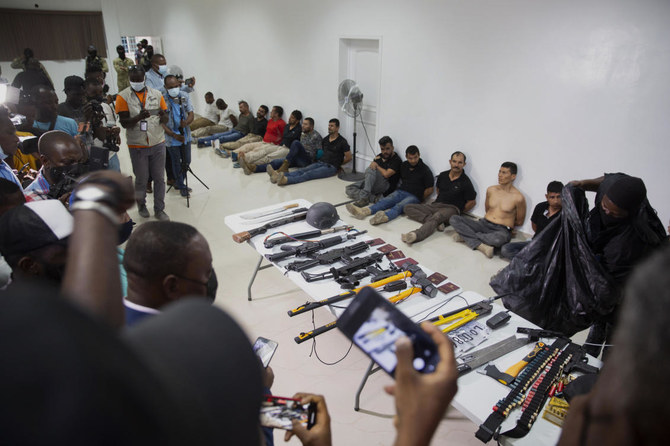
33 Muslims arrested for attacking 2 Christian men on allegations of desecrating Qur’an in Pakistan
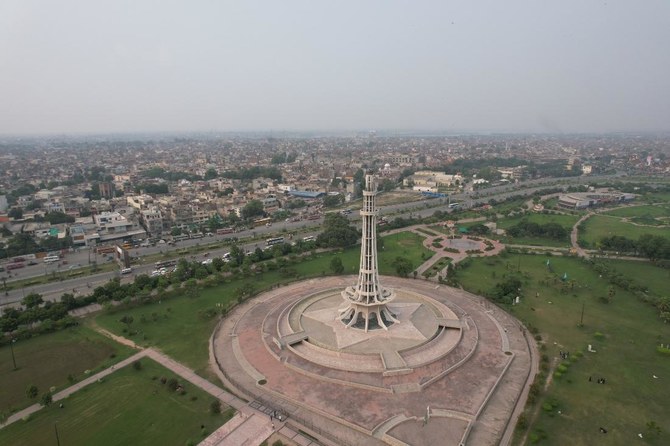
The mob went on a rampage Saturday after locals saw burnt pages of the Qur’an outside the two Christian men’s house and accused the son of being behind it, setting their house and shoemaking factory on fire in the city of Sargodha in Punjab province, said senior police officer Asad Ijaz Malhi. They also beat up the son.
Malhi said police forces rescued the two wounded men and transported them to a hospital where they were in stable condition, and that at least 33 men were arrested following multiple police raids. Authorities were chasing others who may be involved in the attack, he said.
The blaze fully incinerated the factory and parts of the house, residents and the police said.
Punjab police said in a statement it beefed up security at churches.
Blasphemy accusations are common in Pakistan and under the country’s blasphemy laws, anyone found guilty of insulting Islam or Islamic religious figures can be sentenced to death. While no one has been executed on such charges, often just an accusation can cause riots and incite mobs to violence, lynching and killings.
The latest violence, however, brought back memories of one of the worst attacks on Christians in Pakistan in August 2023, when thousands of people set churches and homes of Christians on fire in Jaranwala, a district in Punjab province.
Muslim residents at the time also claimed they saw two men desecrating the Qur’an.
Indian police arrest hospital boss after six babies die in fire
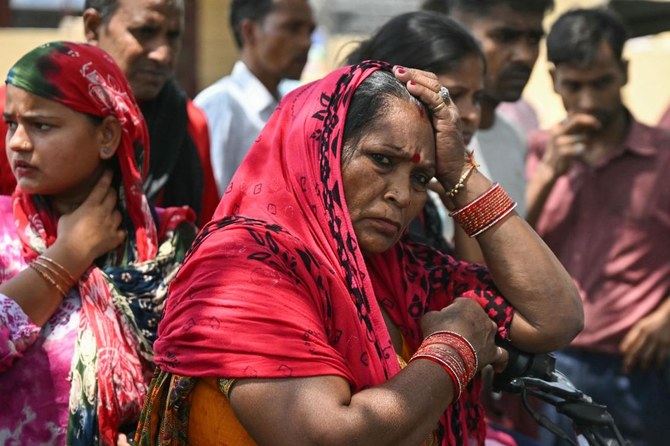
- Blaze broke out at the New Born Baby Care hospital in New Delhi’s Vivek Vihar area late Saturday evening
- The narrow two-story hospital building was squeezed between a row of homes, without space on either side
The blaze broke out at the New Born Baby Care hospital in New Delhi’s Vivek Vihar area late Saturday evening.
In the crucial first minutes, it was bystanders who spotted the fire and braved the blaze to rescue the newborns inside.
“We didn’t even name her... I never even held her in my arms,” Anjar Khan, whose 11-day-old daughter died in the blaze, was quoted as saying by the Hindustan Times.
Vinod Sharma, who lost his day-old baby boy, blamed the hospital authorities for the tragedy.
“He had a problem with breathing. The doctor had said that he will be fine in a few days,” Sharma was quoted as saying by the Indian Express newspaper.
“We didn’t know that the hospital would kill him.”
Fires are common in India due to poor building practices, overcrowding and a lack of adherence to safety regulations.
The narrow two-story hospital building was squeezed between a row of homes, without space on either side, making it hard for fire engines to reach.
“We were trying to control the fire, but there was no way to enter the building and rescue the 12 babies who were trapped,” local fire officer Atul Garg told reporters.
Senior police officer Surendra Chaudhary told AFP that the hospital did “not have a fire exit system.”
Its license had expired in March and the owner had crammed into the ward more than twice the number of beds it previously had permission for.
“The hospital had permission for up to five beds but they had installed more than 10 beds,” he said.
“In view of all this, we have made the arrests.”
Five babies pulled out from the fire are still recovering in another hospital.
The blaze in the hospital on Saturday broke out just hours after a separate fire at an amusement park in India’s western state of Gujarat.
The toll from that fire rose to 28 on Monday, police said.
The blaze — which ripped through a center with a bowling alley and other games crowded with youngsters — was triggered by welding work on the ground floor, chief fire officer Ilesh Kher told reporters.
“The CCTV footage clearly shows that a spark from the welding work fell on a stack of corrugated cardboard sheets below, causing the fire,” Kher said.
“This spread very fast as the material was highly flammable.”
The corpses were so badly burned they have not been identified so far.
Police have charged seven people with culpable homicide in connection to that fire.
The two fires came as northern India was gripped by intense heat, with temperatures in Delhi hitting 46.8° Celsius on Saturday, according to the India Meteorological Department.
China to host Egypt’s El-Sisi, Arab leaders this week
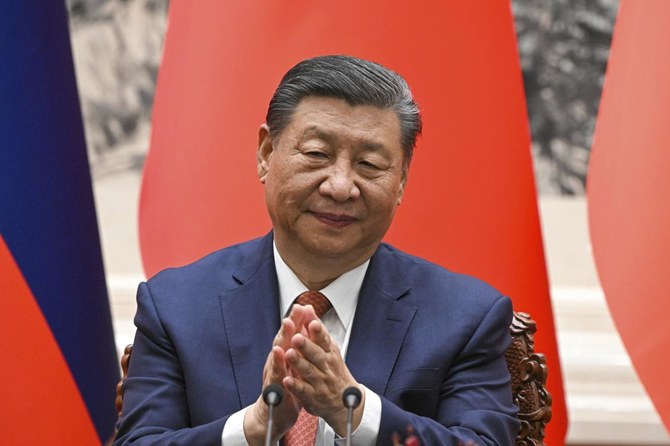
- Speaking at a press conference in Beijing, Vice Foreign Minister Deng Li said President Xi Jinping would attend the forum and deliver a keynote address on Thursday
BEIJING: China will host Egyptian President Abdel Fattah El-Sisi as well as a number of other Arab leaders in Beijing this week, its foreign ministry said Monday.
The leaders will from Tuesday to Saturday “pay state visits to China and attend the opening ceremony of the 10th Ministerial Conference of the China-Arab States Cooperation Forum,” foreign ministry spokeswoman Hua Chunying said in a statement.
Also among the delegation will be Bahrain’s King Hamad, Tunisian President Kais Saied and the United Arab Emirates President Sheikh Mohamed bin Zayed Al Nahyan.
Speaking at a press conference in Beijing, Vice Foreign Minister Deng Li said President Xi Jinping would attend the forum and deliver a keynote address on Thursday.
Xi would also “hold talks with the four heads of state respectively to exchange views on bilateral relations and regional and international issues of common concern,” Deng said.
The forum would aim to deepen “consensus between China and Arab countries,” Deng said, and would be co-chaired by top diplomat Wang Yi and his Mauritanian counterpart.
They would also “issue a common voice between China and Arab countries on the Palestinian issue,” he said.
China has sought to build closer ties with Arab states in recent years, and last year brokered a detente between Tehran and its long-time foe Saudi Arabia.
During a tour of the Middle East in January, top diplomat Wang met El-Sisi in Cairo, saying relations had reached their “best level” in history, according to a foreign ministry readout.
And the meeting with Arab leaders in Beijing comes as China seeks to position itself as a mediator in the conflict between the Palestinian militant group Hamas and Israel.
Wang’s trip to Egypt saw the two countries release a joint statement on the conflict, expressing support for a “comprehensive, just and lasting settlement.”
China has historically been sympathetic to the Palestinian cause and supportive of a two-state solution to the Israeli-Palestinian conflict.
And Xi has called for an “international peace conference” to resolve the fighting.
Israel’s has has killed at least 35,984 people in Gaza since Oct. 7, mostly civilians, according to the Hamas-run territory’s health ministry.
Millions without power as cyclone Remal pounds Bangladesh and India
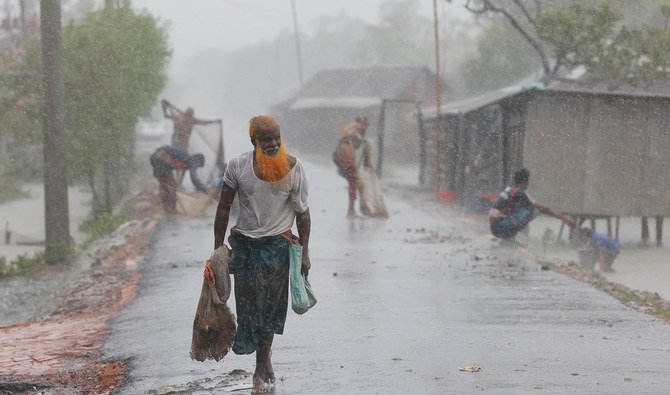
- One person killed in Kolkata after concrete chunks fell on him during storm’s peak, police say
- Bangladesh moved about 800,000 people from port areas of Mongla, Chittagong since Sunday morning
DHAKA/KOLKATA: Strong winds and heavy rain pounded the coastal regions of Bangladesh and India as severe cyclone Remal made landfall late on Sunday, leaving millions without electricity after power poles fell and some trees were uprooted by gusty winds.
The storm crossed the coastal regions of Bangladesh’s Mongla port and the adjoining Sagar Islands in India’s West Bengal state with wind speed measuring up to 135 kmph (about 84 mph), the India Meteorological Department (IMD) said.
The storm will gradually weaken into a cyclone during the morning on Monday and then move northeast and gradually weaken further, the IMD said in its latest weather update.
The landfall process began around 9 p.m. local time in India on Sunday and continued for about five hours, the regional meteorological office in Kolkata said.
One person was killed in the major metropolitan city of Kolkata when concrete chunks fell on him during the peak of the storm, police said. Roofs of thatched huts were blown away while mud houses were flattened in the coastal areas of both countries as authorities waited to ascertain the full scale of losses.
The low-lying coasts of South Asian neighbors Bangladesh and India have experienced frequent severe storms in recent years as climate change forces a rise in sea surface temperatures. Remal is the year’s first cyclone in the region.
Bangladesh moved about 800,000 people from the port areas of Mongla and Chittagong and nine coastal districts to storm shelters from Sunday morning. As many as 110,000 people were also taken to shelters in India.
Dhaka set up nearly 8,000 cyclone shelters and mobilized 78,000 volunteers ahead of the storm while the Indian navy said it had kept ships, aircraft, divers and medical supplies on standby for deployment if required.
While early warnings and timely evacuations helped both countries avert major casualties from the storm, there was a heavy toll on power infrastructure.
Authorities in Bangladesh shut down electricity supply to many areas in advance to avoid accidents while many coastal towns were left in the dark as fallen trees and broken lines disrupted supply, power ministry officials said.
“We have no electricity since night, my mobile battery will run out anytime. By the grace of Allah, the cyclone was not as violent as we thought,” said Rahat Raja, a resident in the coastal district of Satkhira in Bangladesh.
Reports of at least 356 uprooted electricity poles and damage to scores of transformers were received during the first hour of the landfall process, Arup Biswas, the minister for power in West Bengal government, said.
More than 50 international and domestic flights had to be canceled in Kolkata city as operations were suspended from Sunday noon. Bangladesh also suspended operations at Mongla and Chittagong ports.
“Normal airport operations will resume from 9 am,” said C Pattavi, the director of the Kolkata airport, adding that the airport’s operational areas were clear from waterlogging.
River embankments in the Sundarbans delta, the largest mangrove forest in the world, shared by India and Bangladesh, also suffered heavy damage with high tides breaching protective embankments at many places.
Kolkata, like the state’s coastal belt, was also lashed by heavy rains with water logging in many areas, television footage showed. At least six trees were uprooted, which blocked roads, while there were also reports of wall collapses, police said.
The cyclone also brought heavy rains to Bangladesh capital Dhaka, causing flooding of roads and severely impacting commuters.
China’s premier hails ‘new beginning’ with US-allied South Korea, Japan
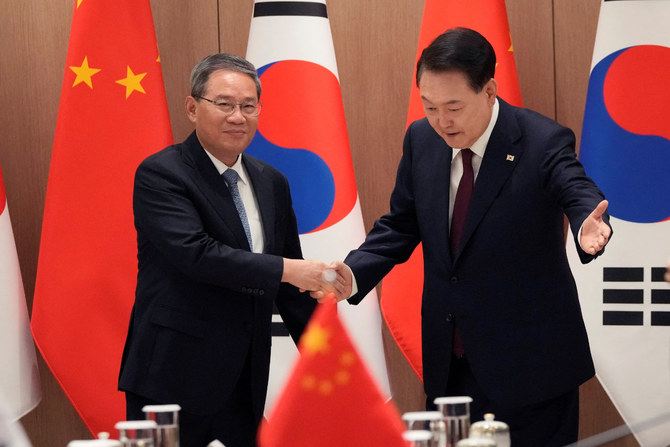
- Li Qiang met South Korean President Yoon Suk Yeol, and Japanese Prime Minister Fumio Kishida in three-way talks
- The three nations are trying to manage rising distrust amid the rivalry between Beijing and Washington and tensions over Taiwan
SEOUL, South Korea: Chinese Premier Li Qiang praised what he called a restart in relations with Japan and South Korea as he met their leaders for the first three-way talks in four years on Monday in Seoul, striving to revive trade and security dialogues hampered by global tensions.
Li, South Korean President Yoon Suk Yeol, and Japanese Prime Minister Fumio Kishida will adopt a joint statement on six areas including the economy and trade, science and technology, people-to-people exchanges and health and the aging population, Seoul officials said.
They may also agree to resume three-party free trade agreement negotiations, which have been stalled since 2019, according to Japanese media reports.
At the summit, Li called for the comprehensive resumption of trilateral cooperation with an open attitude and transparent measures, China’s official Xinhua news agency reported.
He said relations between the three nations had not changed despite profound global transformations.
“Our meeting today, first in more than four years, is both a restart and a new beginning,” Li said, according to a post on X by China’s foreign ministry.
China and US-allied South Korea and Japan are trying to manage rising distrust amid the rivalry between Beijing and Washington and tensions over democratically ruled Taiwan, which China claims as its own.
Yoon and Kishida have charted a closer course with each other and to Washington, embarking on unprecedented three-way cooperation with the United States on military and other measures.
Monday’s summit comes a day after the leaders met separately for bilateral talks with each other.
In those meetings, Li and Yoon agreed to a diplomatic and security dialogue and resume free trade talks, while Kishida and the Chinese premier discussed Taiwan and agreed to hold a new round of bilateral high-level economic dialogue.
Yoon also asked China to play a constructive role with its partners in North Korea, which is expanding its nuclear weapons and missile arsenal in defiance of United Nations Security Council resolutions.
North Korea has notified Japan of its plan to launch a rocket carrying a space satellite between May 27 and June 4, the Japan Coast Guard said on Monday.
Officials from the United States, Japan, and South Korea held phone talks in response to the notice and demanded that North Korea cancel the launch because it would use ballistic missile technology in violation of the UN resolutions, Japan’s Foreign Ministry said.
Trade relations
The trade relationship between China, South Korea and Japan has evolved over the past decade to become increasingly competitive.
Those ties have been further tested by US calls for its allies to shift their supply chains for key products, such as semiconductors, away from China.
Officials and diplomats from South Korea and Japan have set a low bar for the summit, saying it is uncertain whether there will be major announcements but that just gathering will help the three countries revive and reinvigorate their strained relations.
The three leaders are also due to attend a forum with top business executives.
South Korea, Japan and China held 16 rounds of official negotiations over a three-way FTA after they first kicked off in 2012.
At their last negotiation in November 2019, the three countries agreed on liberalization at a level higher than the Regional Comprehensive Economic partnership (RCEP), of which they are all members, encompassing areas from trade of goods and services to investment, customs, competition and e-commerce.



